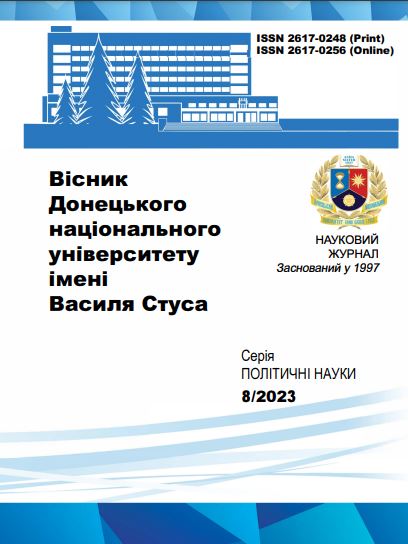Public opinion and the public sphere of politics: possibilities of interaction in the conditions of democratization
DOI:
https://doi.org/10.31558/2617-0248.2023.8.4Keywords:
public opinion; public sphere of politics; democratization; political transformation; political institutions; political parties; public movementsAbstract
The article is devoted to the study of the spread of the technology of manipulating public opinion in the conditions of digital political communications. It is emphasized that the public sphere of politics acts as a state of the political system of each state or society, which reflects the self-sufficiency of the participants in the political process, the presence of communicative political competences in them, as well as the formation of ethical safeguards against the distortion of the political will of individuals and groups. The demonstrated autonomy of public opinion from Internet manipulation is a matter of separating democratic political systems from autocracies or failed states. The acquisition of new probable scientific results regarding the targeted direction of political participation, the directions of the evolution of democracy and civil society in the era of globalization and the development of communication and communication technologies has been established. The relationship between public and private spaces, the assimilation of the provisions of the theory of information society in accordance with the tasks of political science acquires the revealed meaning. the formation of public opinion, which is manifested in the disclosure of institutional-infrastructural and analytical-prognostic dimensions of public political activity and state-authority public policy, which are in relations of mutual influence and mutual complementarity. The presented research results can be applied by political science researchers, as well as by representatives of other social and humanitarian disciplines who develop public policy problems, discussion procedures and democratic collegial decision-making. The importance of political parties, public movements and interest groups, which, despite the digitization of politics, act as factors of ensuring pluralism and political competition on the procedural foundations of democracy is established. Attention is paid to reflecting the key trends of public political activity, putting forward proposals and recommendations regarding the improvement of procedures and adaptation of the public sphere of politics to the processes of global development. At a new level, the points of intersection of the subject spheres of political communication and the public sphere of politics within the framework of the phenomenon of public political communication, as well as coding and decoding of messages of public political behavior, are substantiated. The formation of an environment of epistemic freedom within the public sphere of politics, which contributes to the search for optimal solutions in the context of political management of society, is outlined. The possibilities of political Internet communication, confirmation of the principle of heterogeneity of political positions in the processes of making political decisions have been revealed. The limited effectiveness of the project of universalization of democratic values, the formation of information culture as a basis for the perception and dissemination of political information and the emergence of new technologies of control, the aggravation of global problems of humanity and global competition are emphasized. It has been found that the initial stage of the constitution of the public sphere of politics can be the institutionalization of public discussions both in the virtual media space and offline.
References
Балуцька Л. Громадська думка як складова процесу інституціалізації демократії в сучасній Україні. Вісник Львівського університету. Серія філософсько-політологічні студії. 2012. Вип. 2. С. 198-204.
Баранов О. А. Інформаційна сфера: реформування інституційної системи публічної влади. Право України. 2018. № 11. С. 65-84.
Братель С. Г. Формування громадської думки про правоохоронну діяльність міліції. Митна справа. 2013. № Спец. вип. С. 274-278.
Висоцька О. Є. Комунікативні технології постмодерну. Бібліотекознавство. Документознавство. Інформологія. 2009. № 2. С. 73-78.
Дембіцький С. С. Особливості громадської думки в Україні під час війни (академічний досвід). Вісник Національної академії наук України. 2023. № 5. С. 86-89.
Кваша О. П., Болотіна Є. В., Котов Я. А.Вплив комунікаційних та інформаційних технологій на формування громадської думки в сучасному суспільстві. Регіональні студії. 2020. № 22. С. 51-56.
Кривошеїн В. В. Виборча фреквенція як індикатор політичної активності. Грані. 2013. № 8. С. 141-148.
Крупчан О. Д. Публічна сфера і право публічної власності. Приватне право і підприємництво. 2017. Вип. 17. С. 5-9.
Мельник А. Публіцистика як сфера формування ціннісних орієнтирів та етосу особистості: теоретичний аспект. Вісник Львівського університету. Серія : Журналістика. 2018. Вип. 43. С. 133-143.
Никифоренко А. Р., Баєв А. І. Задоволеність запоріжан діяльністю міської влади та якістю муніципальних послуг (за матеріалами опитувань громадської думки). Габітус. 2021. Вип. 32. С. 18-25.
Семенець О. Маніпулятивні дискурсивні практики використання концепту ‘патріотизм’ та їхній вплив на громадську думку (критичний дискурс-аналіз та соціології. Вчені записки Таврійського національного університету імені В. І. Вернадського. Серія : Філологія. Журналістика. 2022. Т. 33(72), № 1(3). С. 155-160.

